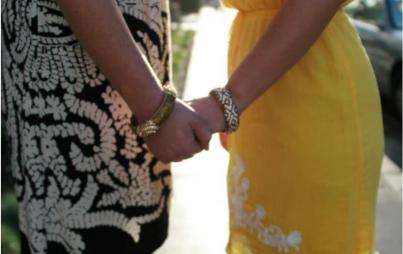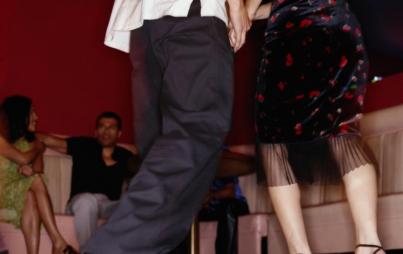
Photo by Jonatán Becerra on Unsplash
What is that?
I swivel my head to see a thicket of dark coiled hair covering a tanned arm. It rests casually behind me, propped on the back of my chair.
What do you think you’re doing?
I think it. But don’t utter the words aloud. After all, I’m at a dinner party deep in the tamed heart of suburbia. Instead, I turn to Brian, owner of the arm. He’s chatting up our host. I wait for him to finish. When he does, I’ll simply ask him to . . .
Stop touching me, I want to yell at him, but that would put a damper on the evening. Maybe I can move away from him. What if I inch up? Perch on the edge of the chair. That could work. My heels dig in. I try pushing the chair back so I can readjust. No good. We’re wedged in too tight.
The echo. It’s there. It’s what women are told. We’re too sensitive, too emotional; we’re overreacting. Why can’t we be rational, reasonable? What’s wrong with us?
I dart another look at Brian. He’s oblivious to my discomfort. Telling a joke. Everyone else laughs, including his wife. He’s in his element. So much so that his arm extends. His hand wraps around my shoulder. His fingers brush against it. I am frozen.
My husband David is seated diagonally opposite me at the far end of the table. I could change seats with him. I try to catch his eye. Not happening. Then I think about it. What excuse would I give? Our hosts assigned the seats. And we’ve just sat down to dinner. A second ago I was starving; I couldn’t wait to dig in —perfectly cooked lamb chops, double fried potatoes, a fresh tomato salad. Not now. My stomach lurches. I feel sick.
Okay, I’ve got to say something. I can’t spend the entire evening feeling like this. All I have to do is say, “Excuse me but could you please just take your arm off the back of my chair?”
I turn to look at Brian. I see a balding, middle-aged man of average height who is the opposite of imposing. I mean to say it. I do. But somehow I can’t get the words out. I sit there, stiffened. He must feel me staring at him because he turns my way.
“I hear you’re a writer,” Brian says.
He’s waiting for an answer, smiling pleasantly at me. It’s now or never. What’s wrong with me? Why can’t I just tell him . . . I’m usually so direct, so outspoken.
Brian interprets my silence as reticence, “Would I know your work?
I swallow. Shrink into myself. “I doubt it,” I tell him because he probably doesn’t read mystery novels.
Better this way, I think. It’s not a capital crime resting your arm on the back of someone else’s chair. He’s not trying to make me uncomfortable. It’s me.
I'm too sensitive. I should just let it go.
That’s how I was categorized growing up; I was the sensitive one — the girl who was so easily reduced to tears. I was the youngest of three, my brother, the eldest. He was away much of my childhood, first a boarding school, then at college. When he did come home, I avoided him. He was adept at torture, and his anger was a flashpoint. He terrified me. My sister, the middle child, was ten years older than I was and outspoken to the point of being rude. She and my mother would scream at each other. My way of dealing was to hide in my room. I hated conflict. To avoid it, I did my best to be good. Okay, not just good, perfect. Not an attainable goal. But tell that to a seven-year-old.
Snapshots of my childhood: I was seven, and my father was teaching me how to play checkers. Dad sat across the board explaining the rules. Then we began. His pedagogical approach was very old school. To master the game, I had to understand the strategy of it. This meant watching as he beat me. Once. Twice. Three times. It was crushing. I wilted. Sobbed. Then went running from the room.
Dad came to find me, saying, “Darling, you won’t ever learn how to win if you can’t learn how to lose gracefully.”
His logic was, as always impeccable. After all, he was a lawyer. He’d even argued in front of the Supreme Court. I knew he was right; I was supposed to be stronger than this. But it hurt so much. What was wrong with me? Why was I so weak? I felt terrible. Still, I couldn’t muster the courage to play with him again. If only I were different — a girl with thicker skin — then I could have swallowed my pride and turned those multiple losses into a teachable moment. I could have watched him like a hawk and learned and then cleverly routed him.
To his chagrin, I wasn’t that girl at all.
“You’re too sensitive,” he claimed.
The label stuck.
Dad loved the law. But he made no secret of his greatest regret. He’d always wanted to be a writer. He swore he had a novel in him, and when he retired, he was going to find the time. Put pen to paper. I wanted nothing more than to please him, so I emulated him. I’d been a precocious reader, learning to read at three. In elementary school, I tackled Jack London, then Dickens, then Shakespeare. And early on I made up stories — sweet, fractured fairy tales that I hand illustrated. They featured winged horses and intrepid heroines.
“How wonderful,” he said when I showed my newest opus to him. “What an imagination you have Nomi.”
My heart swelled with pride. It turned out to be pride before the fall because in Eighth Grade my beloved English teacher asked us to craft a short story. I labored over it for days and days — editing, revising, working and reworking. There, it was finally done.
“Will you read it?” I asked him.
“Of course. I’d be honored.”
He sat down next to me, there at the dining room table. He had put his legal pad next to him. He’d sharpened his Mongol pencils. They were tools of the trade; he wrote briefs with them in longhand. I didn’t take much notice, or maybe it was only that I was confident. This was my best work. I was so proud of it. I knew he’d love it.
You Might Also Like: When Getting Out Of Bed Feels Like Climbing A Mountain
He started to read. And his hand strayed. Gripped a pencil. Then he set the tip down onto the first typed page. He began to cross out my words. Scribbled his own above them. “There,” he said to himself. “Better.”
I couldn’t believe it. Was he really rewriting my entire story? Was it so terrible? It must have been. I winced every time the pencil slashed the paper. And then I started crying silently. Dad didn’t even notice. He was lost in his work.
At a certain point, I got up and left. Went into my bedroom, burying my head in the pillow. Dad came in to find me. He seemed genuinely bemused.
“Darling, what’s wrong?”
I tried to tell him. He’d savaged my work. Revising it that way, rewriting felt like he was erasing me. Those were my words, and besides, I’d edited it myself over and over again.
“But you wanted my opinion,” he said gently.
He couldn’t for the life of him, understand. Why wouldn’t I want to improve? He was only trying to help me . . .
“I think you’re being too sensitive,” he said.
Maybe I was. Or maybe I didn’t want him to take what was mine and make it his. I sidestepped his judgment after that. I didn’t show him anything until teachers, professors, editors vetted it. Only then did I share it with him.
I adored my father. And I craved nothing more than to be close to him. If I couldn’t share my writing with him, maybe there was something else? It took a while to figure out, but it turned out there was.
At seventeen, I was trying to extricate myself from my first real relationship. I couldn’t ask my mother for advice. She was beyond prudish — ironic since she was an OB-GYN and the head of a family planning clinic. Her opinion on the subject of sex had been crystal clear. You stay a virgin until you’re married. Full stop.
My dad was her polar opposite. Reassuring, accepting and open-minded. He supported me. Helped me navigate the break-up. And he was there for me when I fell in love again. He accepted me for who I was. It was a relief to have a parent I could talk to. I treasured our lunches at the Chinese restaurant near his office. It was oddly intimate, even in the middle of the day. The window glass was tinted, the space dark and cavernous.
“Your dad’s wonderful,” my friend Helen said. “You’re so lucky to have him.”
I nodded. I hate to admit — I even felt a little smug about it.
♦♦♦
My father has been dead for thirteen years. Still, it’s easy to resurrect him. He loved throwing dinner parties — loved holding court, seated right where our host is now, at the head of the table. Dad was handsome and more than a little vain about it, with that aquiline nose, the shock of graying, then silver hair. He’d tell stories and weave in political commentary — so erudite, so charming. I loved watching him work a room.
I shiver. Glance surreptitiously at Brian. And realize why I couldn’t tell him to remove his arm, the arm that I’ve spent the entire night pretending not to notice, the arm that creeps around my back and violates my personal space. I’ve been silenced, just as I was so many years ago.
♦♦♦
It was an intimate gathering. There were four of us seated at my parents’ dinner table — dad, mom, me, and my soon to be husband, David. Dad downed his usual stiff drink, then kept pouring, two more glasses of a dubious burgundy. He raised his glass to make my birthday toast.
“To my darling daughter, is it really possible? I remember when you were so young, those little breasties, and now look at you.”
I blanched, then turned beet red. Surely my mother would chastise him. Wrong. She pretended to be deaf. Got up and left the room instead. I heard her puttering away in the kitchen. David and I exchanged furtive looks. We’d been living together for almost a year by then. My mother had made it clear she wasn’t happy about my choice. He wasn’t Jewish. And he was younger than I was. I thought she’d be the one to pick him apart. Instead, this was happening. The night was taking a turn I could never have imagined. Should I say something? But what would that be?
I told myself it was better to let it go; Dad had had too much to drink. That’s all it was. Just then, in came my mother bearing the birthday cake. We sang happy birthday. I choked it down and made a beeline for the door.
Dad came over to bid me goodnight. I leaned in to kiss his cheek — only something happened, some subtle last minute readjustment —and suddenly his lips were pressed onto mine. Then he slipped his tongue into my mouth.
I froze. Then pulled away, shocked.
“See you soon,” Dad said.
He smiled at me, looking entirely innocent, and then he shut the door. I stood there in the alcove, trembling. I wanted to wipe my mouth with the back of my hand, wipe the stain away. I turned to David.
“He just tongue kissed me,” I whispered as if Dad could hear me through the door.
David winced. We stood there, staring at each other. The elevator pinged. The door slid open. I’d never felt so grateful. We got on and plummeted to the first floor. The doorman who I’d known since I was a child was in the lobby. “Have a great evening,” he said, holding the door.
We stepped out onto 86th Street. It was a crisp, chilly night in January.
“Let’s walk home,” I said.
Twenty blocks north, the whole way my mind was racing. We passed Sloan’s where my mother and I would go to buy groceries, the pet store where I stocked up on my angelfish and guppies, the Hunan restaurant where I first tried real Chinese food and spent the next half hour gulping down ice water; everything was achingly familiar. It felt so wrong; my world was forever changed.
I didn’t talk about it on the walk home. I was embarrassed. So confused. David didn’t bring it up either. I was grateful because all I wanted to do was pretend it had never happened. I silenced myself that night. Buried the memory. Shoved it someplace so deep down it took me almost twenty years to recall that it had even happened.
♦♦♦
Tonight, we thank our hosts and leave. In the car, David turns to me, “That was fun, wasn’t it?”
“I guess.”
“What’s wrong?”
“It’s only. Did you notice how that guy Brian had his arm around my back all night?”
Our eyes meet.
“Oh yeah, that was weird. You hate when anyone touches you. Not to mention, it’s just odd someone presuming they could do that to someone they just met.”
“Would you?” I asked.
“Me? Never!”
I’m suddenly angry, “So why didn’t you say something to him?"
David’s surprised. “I just assumed you were okay with it. I mean, when have you ever had an issue with telling some guy off?”
He’s right about that. If a man shoves me on the street in a rush to get by, I bristle and snap at him. If a guy tries to man-spread against me on the subway, I slam my leg into his and say, loudly, “Excuse me!” I’m a lap swimmer, and I know the regulars. If I think they’re going to infringe on my side of the lane, they get the warning, “So long as you don’t bump into me.” My reputation precedes me.
But tonight I sat there, suffering in silence. Why?
“I guess I couldn’t figure out if I was overreacting. I kept hearing this voice in my head,” I say.
“Saying what?”
I let out a laugh. “You're too sensitive.”
♦♦♦
The echo. It’s there. It’s what women are told. We’re too sensitive, too emotional; we’re overreacting. Why can’t we be rational, reasonable? What’s wrong with us?
Nothing. Honestly, what’s wrong with them? Why do they have to be so . . . creepy. Because really that’s what this is about. It isn’t just the strangers; the grizzled man who offered to buy twelve-year-old me and take me home to be his personal servant or the leering exhibitionists who seemed to pop up when I least expected it.
It’s also the men I loved and trusted — friends who insisted that our friendship required that I sleep with them, professors who heaped praise on me then expected quid pro quo, and ultimately my own father.
What he did that night ruined my relationship with him forever. If only I could rewrite history, take my pencil and shave away the things that most hurt.
After that night, I buried the kiss, but I pulled away from him. Made excuses not to meet him for lunch. Stopped confiding in him. He was clearly hurt. He’d jab at me, trying to get a rise out of me. I retreated even more. I washed away my memory, but I couldn’t stop my body from protecting itself involuntarily. So there was the physical distance. Every time he hugged me, I’d tense up. There would be this knot in the pit of my stomach. I couldn’t pinpoint why.
Twenty years later it came flooding back to me. I don’t even know what prompted it, maybe something I’d read, or a scene I was working on in a novel I was writing. I went into the kitchen where David was making dinner, and I said, “Do you remember that birthday dinner when my father . . .”
You know, tongue kissed me and talked about my breasts?
He nodded.
Indelible. In the hippocampus.
I never spoke to my father about it. I just couldn’t figure out how. I lived with that discomfort. Coped as best I could. I loved him so much, and I was afraid of what would happen if I did bring it up. It seemed an impossible task. Everyone in my family would hate me for it. They all adored him. They’d probably not even believe me.
I’d be ostracized or worse.
I’d lose him forever.
So I kept silent. What else could I do?
I kept my secret.
But at least, I had a witness, David.
So many times there isn’t someone to back you up. It’s your word against theirs. Yet you know.
And what they’ve done changes you as it changed me, the person I usually am — the brazen bitch who has no problem speaking her mind vanished, replaced by a submissive, equivocating woman I barely recognized.
Of course, I do. She’s the good daughter, the one who only wanted to please and never could, who craved her father’s acceptance and approval because she loved him so much that she’d do anything for him. Which is why she choked down the shame, the anger, and underneath it all, the truly unbearable sadness that came when someone she trusted so much betrayed her with a kiss.
It’s how we deal with what happens to us. It’s our fault when the stranger at a party snakes his hand round our back. It’s on us when the creep at the bar offers us a seat, then lifts us onto the bar stool, copping a feel. “Smile, pretty lady,” is just some guy being friendly. When the professor we admire corners us in his office, it’s because we sent the wrong message. Our skirts are too short, our jeans too tight. Our blouse was unbuttoned provocatively low. We drank too much at that party, flirted too brazenly, why else would he think that “no” meant, “yes.”
Surely if we’d screamed someone would have heard. So what if his hand was over our mouth and we couldn’t breathe? So what if we thought we were going to die? If we didn’t want something to happen, we should have put on that chastity belt before we left the house. It’s always our fault. We try to speak up and look what happens. Those tears. They’re a sign of our anger and frustration, seething until it explodes. But hey, take your chances, go on, keep telling us we’re too goddamn sensitive.








